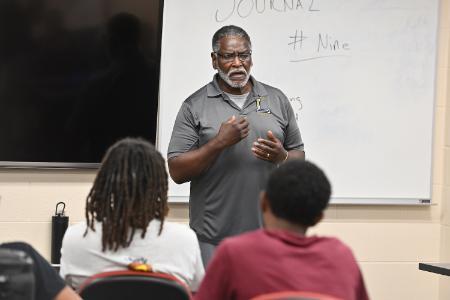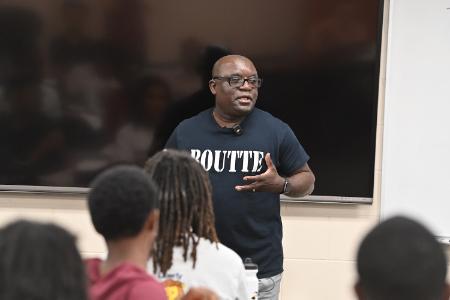COW Program Returns to VMI for 39th Year

Eugene Williams ’74 teaches life-transforming values and skills to the young men attending COW in July. –VMI Photo by Kelly Nye.
LEXINGTON, Va. July 22, 2025 — Albert Schweitzer, Nobel Peace Prize laureate, theologian, and medical missionary said, “One who gains strength by overcoming obstacles possesses the only strength which can overcome adversity.” College Orientation Workshop, Inc. (COW), a four-week challenging educational enrichment program, returned to Virginia Military Institute this summer, marking its 39th year of transforming the lives of promising, male, minority and at-risk high school students.
This year, 30 students from ten states and the District of Columbia participated in the program that taught them to overcome obstacles through intense physical training, classroom instruction in mathematics and English, public speaking, financial literacy, and career exploration. The students engaged in choral music, improved their swimming skills, completed an obstacle course as a team-building exercise, engaged in community service activities, and learned firefighting and lifesaving skills with the city of Lexington Fire and Rescue Team. They were challenged to overcome their fears by repelling from the 160-foot cliff above the Maury River, and enjoyed fun activities such as kayaking, canoeing, camping, fishing, going on field trips, and picnicking.
The students had the benefit of hearing from guest speakers who shared their life experiences and imparted knowledge of how they overcame adversity and life challenges to successfully attain their goals. Among the many notable speakers were retired Navy Vice Adm. Kevin Scott, who most recently served as vice director for Joint Force Development in Suffolk, Virginia; retired Army Brig. Gen. James Gorham, author, motivational speaker, and the first black brigadier general of the North Carolina National Guard; City of Lexington Police Chief Angela Greene; retired Marine Sgt. Maj. Al Hockaday, a plank owner — a Naval term referring to an original crew member—of the VMI Naval ROTC unit; and Leon Ford, who in 2012, at the age of 19, was shot by a Pittsburgh police officer as he was racially profiled during a case of mistaken identity. Ford later discovered the power of forgiveness and has dedicated himself to bridging the gap between the police and the communities they serve.
In addition, the students heard from retired Army 1st Sgt. Larry Thomas, CEO and founder of the Thomas Mentor Leadership Academy (TMLA), a nonprofit in Durham, North Carolina, dedicated to mentoring males between the ages of 7 and 18 who are being raised by a single parent, single legal guardian or their grandparent(s).
Thomas opened his talk by telling the 30 teens that they are a team and if someone was missing from the team, they would know it. “So, it’s important to know if somebody’s not having a good day, and to know how you can encourage them. You always have to be mindful of that. You have no idea what a person is going through and what he is dealing with. You need to know how to treat people. We need to treat people right. Regardless of race, color, creed, gender, or whoever they are, treat people right!”
He led the students on a classroom exercise he called, “Taking Off the Mask.” He asked the teens to take a piece of paper that represents their “mask” and without identifying themselves, list three things on one side of their mask that they freely show the world every day, and on the flip side of their mask, he asked them to list three things they wish they could share with others without being judged. The results were eye-opening and unsettling. Thomas read a few aloud to the class. “One person wrote, ‘I’m funny, I’m lenient, I’m enthusiastic,’ but that same person wrote on the backside of his mask, ‘My sins. I wish I could share my true feelings with people.’ Another person wrote, ‘I like smiling, I like black shoes, and I like using my voice,’ but on the flip side he wrote, ‘I wish I could talk to somebody. I need help solving my problems.’ A third person wrote on the front side of their mask, ‘I smile, I laugh a lot,’ but on the back side of their mask, ‘I just want to talk to somebody about my tears and my anger.’ These are some powerful things that a young man in this room is dealing with. He may be the one who you wake up next to each morning. Be kind to each other. Support each other.”
Thomas explained that at the TMLA, there is no “safe space,” but there is a “brave space.” “We call it a ‘brave space’ because you have to be brave to stand up and share your private thoughts, and you were brave today to do this exercise.”
Thomas concluded his talk by commending the teens for attending COW, even though many of them did not want to attend. “You could be home, walking around in the mall with your friends. But you know what? You made up your mind to be here instead. You’re learning something. While your friends are home still sleeping in the bed, you are here learning. You have been given an opportunity to tell your friends at home, ‘I went to VMI for a camp for 30 days. It was hard for me, not only physically, but mentally!’ You have a testimony to share when you return home. Everybody must have a purpose in life. Some teenagers may ‘flop around’ with no accountability, and no responsibility, but you’re here. Let’s see it through to completion. I’ll see you at graduation on July 19.”

Williams stressed that COW is not a summer camp, but a transformational experience. “We take these kids who have promise and potential, but have failed to achieve their potential, and push them out of their comfort zone,” explained Williams.
Over the life of the program, approximately 75% of participants go on to attend college. The other 25% have attended trade schools, entered the military, or worked in other civilian pursuits.
Interested students submit an application for the program that includes an essay and an agreement to “pay it forward,” meaning they will do acts of service in the future to repay the generosity shown to them through the program. There is no charge to the students selected to the program, since in most cases, neither the participant nor his family have the resources to cover the costs. It is a fundamental tenet of the COW program, which is a 501(c)(3) nonprofit, that lack of economic resources should not prevent a deserving student from participating. All funds to cover the costs of the program are raised by private donations, small foundation gifts, or through the annual signature fundraising event, the COW Golf Classic at the Country Club of Virginia in Richmond. For more information or to donate, visit the website cow4life.org.
Marianne Hause
Communications & Marketing
VIRGINIA MILITARY INSTITUTE
.svg)
.png)